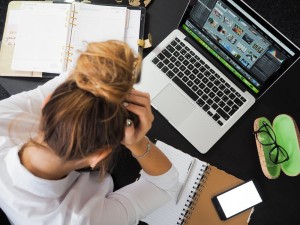Workers are most likely to experience career burnout at the age of just 32, a study has found.
A poll of 2,000 employed adults found nearly a third have felt like they can’t go on at some point in their career due to being stressed and exhausted.
More than half of those put this down to trying to do too much (52 per cent) while 58 per cent blamed it on working longer hours.
Not taking enough annual leave (39 per cent), feeling like you always have to be on (47 per cent) and pressure to go above and beyond the call of duty to keep your job (37 per cent) also contribute to burnout.
Almost half of those who have felt stressed at work have even quit as a result, while 29 per cent would consider taking unpaid leave if they were finding it too much, according to the study by flexible workspace provider TOG (The Office Group).
But while working from home has been hailed as the solution to improving work/life balance, since lockdown it has resulted in many working more hours than ever.
More than half of those polled said they had been working outside of their contractual hours since lockdown, putting in an additional 59 hours – or the equivalent of seven working days – over the last five months.
TOG partnered with consultant psychiatrist Dr Sarah Vohra, also known as ‘The Mind Medic’ to share advice on how to prevent burnout and spot the signs of heightened stress and exhaustion at work.
She said: “With almost a third of people saying lockdown has brought them closer to burnout, there is no question the pandemic has greatly impacted the nation’s collective mental health.
“Companies must put defences in place and guard against elements which might cause stress and anxiety, and looking forward, they must make robust changes to ensure employees are protected, particularly during times of uncertainty.”
The study also found that one in three of those polled blamed the lockdown for getting them closer to burning out.
Employees feel working longer hours due to having their workstation close to them (31 per cent) and the lack of social interaction (27 per cent) both contributed to making the time particularly difficult.
But it also emerged that being young doesn’t necessarily mean being carefree, with almost six in 10 Gen Z workers feeling the strain of the ‘always on’ culture.
The study, carried out via OnePoll, found that in a bid to lower their stress levels, one in five workers have turned to meditation or yoga to relax outside of work.
And 22 per cent want their workplace to offer mindfulness and wellness classes to fight burnout.
Following the findings, TOG and its wellness provider, OPO, are offering free meditation sessions for everyone, including non-members, at www.theofficegroup.com/burnout
DR SARAH VOHRA’S TIPS TO AVOIDING BURNOUT
1. Make clear distinctions between your day and night-time routines
Whether you are commuting to the office, or working from home, make sure you have consistent wake and sleep times. This helps regulate your body’s 24-hour circadian rhythm or sleep/wake cycle.
2. Set aside ‘must-dos’ for the day and write them down
Studies show that the more tasks we commit to simultaneously, the lower our attention span is. This can affect how quickly we complete our tasks, with time often wasted switching between them, making us less efficient and more prone to making mistakes.
3. Ensure exposure to natural sunlight
Your 24-hour body clock relies on repeated patterns of loss of light (night) and return of light (day) to help reset it. Studies show that workers in workplaces with windows not only had significantly more sunlight exposure during work hours, but also slept an average of 46 minutes more each night.















